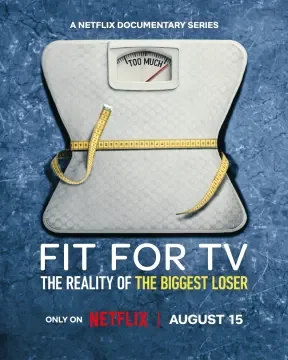Have things changed much since ‘The Biggest Loser’?
In case you haven’t spent time around me in person over the last 48 hours, I recently watched Netflix’s new documentary exposing The Biggest Loser, and you best believe I have THOUGHTS AND OPINIONS (like every other fitness professional you follow does, I’m sure).
If you haven’t seen it, it’s basically an exposé of what really happened behind the scenes of what we saw on television, and what happened to the contestants on the show afterwards.
What was obvious was that The Biggest Loser was not a show about helping people change their lifestyles to get to a healthier place. It was putting vulnerable people through a dangerous and extreme stunt, purely for entertainment. As seasons continued, weight losses became more dramatic, and people took to borderline dangerous measures in order to win. Exercising for 8 hours a day while eating 800 calories or less is not something anybody can maintain, and it’s certainly not a healthy approach.
Unfortunately, we live in a society where people don’t seem to care what kind of approach you take - if you’re losing weight, that’s generally seen as a positive. I’ve heard people talk about the ‘bright side’ of getting gastritis, having chronic anxiety, experiencing grief, even getting cancer - because ‘at least they’re losing weight’ - excuse me, WHAT?!
I’ve been through my own series of semi-traumatic health events, and often I do lose weight after I’ve been in hospital or been really sick, and it feels unsettling when I get told ‘you’re looking soo good!’ and I know that what they’re referring to is the size of my thighs. I needed surgery and couldn’t work for a few months - but at least I got to be a skinny legend…
The problem is, if we haven’t done the work to deconstruct our internalised weight-stigma, we will perceive these comments as praise and validation that thinner always equals better, no matter how it’s attained.
That’s what’s so backwards about it. We say that we want to lose weight ‘for our health’, but if we’re quite happy to go about losing weight in unhealthy, even dangerous ways - how can that possibly be true?
The real reason that most people want to lose weight is because they don’t feel truly comfortable about how their bodies look, and believe that they would feel a lot better about themselves if they were thinner or leaner.
And though that might be true, and I have nothing against that, it’s the approach that people are willing to take that borders on unhealthy that I find problematic. That’s exactly what leads to yo-yo dieting and weight-cycling (where people lose and then gain weight repeatedly), which is linked to all sorts of poor health outcomes.
You’re actually more at risk of type 2 diabetes and cardiovascular disease if you are someone who’s lost and gained weight over and over again than someone who might be at a heavier bodyweight, but has stayed there without trying to diet.
It’s easy to tut-tut The Biggest Loser for enabling such extreme approaches, and say ‘well no wonder they all gained the weight back’ - but we have to look at how we’ve created a culture that makes being in a larger body seem so unacceptable that of course people are going to do crazy things in order to not be.
If we want to learn anything from this documentary, we should strive to create a culture that doesn’t breed a desperation for thinness, at the cost of our health and mental sanity. But unfortunately, I fear that we’re slipping backwards towards that very thing.
We need to stop making bodies and our weight and diets so much of a talking point that we live our lives paralysed by self-consciousness. We need to question why we’re pedestalising thinness so much, as if it’s the only thing that determines our value as human beings. And we need to ask ourselves - if we’re actually doing this for our health, then shouldn’t we be striving to be healthy instead?
The paradox of sustainable fat loss is that when you stop desperately wanting to lose weight all the time and heal your relationship with food, fat loss becomes easier and you’re less likely to ‘bounce back’ afterwards.
The Biggest Loser could have been an opportunity to teach people who were struggling with things like secret eating, binge eating and mental health challenges how to start incorporating healthier habits into their lifestyle and diversify their coping strategies to reduce the need to numb themselves with food. But of course, no one would have watched that.
Amongst all of this very obvious ‘what not to do’ advice we can take from the show, perhaps it’s a good opportunity to ask ourselves:
What is important to us when it comes to our health? What do we want to be healthy for?
What signs are we specifically looking for to assure us we’re on the right track when it comes to our health goals?
If you watched the documentary, or have any other thoughts around this topic - I’d love to hear.
Otherwise,
That’s it from me!
Lx
